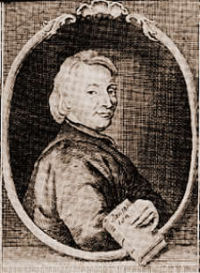- John Toland
-
John Toland (Inishowen, Irlanda, 30 de noviembre de 1670 - Londres, 11 de marzo de 1722) fue un filósofo racionalista y librepensador. Educado en las universidades de Glasgow, Edimburgo, Leiden y Oxford. Publicó muchos libros y panfletos sobre filosofía política y religiosa que son consideradas como expresiones pioneras de la filosofía de la Ilustración.
Contenido
Biografía
Nació en Ardagh en la península de Inishowen, una región predominantemente católica y de habla irlandesa del condado de Donegal, al noroeste de Ulster. Es probable que haya sido originalmente bautizado como "Seán Eoghain Ui Thuathalláin", aunque creció bajo el sobrenombre de "Janus Junius Toland". Tras haberse convertido al protestantismo alrededor de los 16 años, obtuvo una beca para estudiar Teología en la Universidad de Glasgow. Luego, asistió a la Universidad de Edimburgo, donde terminó una maestría en 1690. Seguidamente, recibió una beca para pasar dos años estudiando en la Universidad de Leiden en los Países Bajos y, luego, dos años en la Universidad de Oxford.
Su primer libro Christianity Not Mysterious (1696) ocasionó que fuera procesado por un juzgado en Londres y su libro fue quemado en Dublín. Tras su salida de Oxford, residió en Londres durante la mayor parte de su vida, aunque continuó visitando periódicamente el continente europeo, en especial Alemania y los Países Bajos. Incluso vivió en el continente entre 1707 y 1710.
Pensamiento político
John Toland escribió un centenar de libros en varios ámbitos pero sobre todo dedicados a criticar las instituciones eclesiásticas. Buen ejemplo de su actividad intelectual fue a escribir tratados políticos en defensa de las causas del British Whig Party.
Muchos estudiosos le conocen por su rol como biógrafo y editor de republicanos notables del siglo XVII como James Harrington, Algernon Sidney y John Milton. Sus obras "Anglia Libera" y "State Anatomy" son expresiones prosaicas del republicanismo inglés que reconcilia con una monarquía constitucional.
Tras el libro Christianity Not Mysterious, las opiniones de Toland se volvieron más radicales. Su oposición a la jerarquía en la iglesia le condujo a una oposición contra la jerarquía en el estado: obispos y reyes en ese momento. En su libro de 1704 Letters to Serena - donde acuña la expresión 'panteismo' - analiza cuidadosamente la manera en la cual se llega a la verdad y porqué la población es propensa a las formas de "falsa conciencia".
Obras
- Christianity Not Mysterious: A Treatise Shewing, That there is nothing in the Gospel Contrary to Reason, Nor Above It: And that no Christian Doctrine can be properly called A Mystery (1696)
- An Apology for Mr. Toland (1697)
- Amyntor, or the defence of Milton's life (1698)
- Amyntor, or a Defence of Miltons Life (1699)
- The Art of Governing Partys (1701)
- Limitations for the next Foreign Successor, or A New Saxon Race: Debated in a Conference betwixt Two Gentlemen; Sent in a Letter to a Member of Parliament (1701)
- Propositions for Uniting the Two East India Companies (1701)
- Hypatia or the History of a most beautiful, most virtuous, most learned and in every way accomplished lady, who was torn to pieces by the clergy of Alexandria to gratify the pride, emulation and cruelty of the archbishop commonly but undeservedly titled St Cyril (1720)
- Anglia Libera, or the Limitation and Succession of the Crown of England (1701)
- Reasons for Address His Majesty to Invite into England their Highnesses, the Electress Dowager and the Electoral Prince of Hanover (1702)
- Vindicius Liberius (1702)
- Letters to Serena (1704)
- The Primitive Constitution of the Christian Church (c. 1705; publicado póstumamente en 1726)
- The Account of the Courts of Prussia and Hanover (1705)
- Socinianism Truly Stated (por "un panteísta") (1705)
- Adeisidaemon - o "Man Without Superstition" (1709)
- Origines Judaicae (1709)
- The Art of Restoring (1710)
- The Jacobitism, Perjury, and Popery of High-Church Priests (1710)
- An Appeal to Honest People against Wicked Priests (1713)
- Dunkirk or Dover (1713)
- The Art of Restoring (1714) (contra Robert Harley)
- Reasons for Naturalising the Jews in Great Britain and Ireland on the same foot with all Other Nations (1714)
- State Anatomy of Great Britain (1717)
- The Second Part of the State Anatomy (1717)
- Nazarenus, or Jewish, Gentile and Mahometan Christianity (1718)
- The Probability of the Speedy and Final Destruction of the Pope (1718)
- Tetradymus (1720) traducido al inglés en 1751
- Pantheisticon (1720) traducido al inglés en 1751
- History of the Celtic Religion and Learning Containing an Account of the Druids (1726)
- A Collection of Several Pieces of Mr John Toland, ed. P. Des Maizeaux, 2 vols. (1726)
Bibliografía utilizada
- Este artículo incorpora texto de la Encyclopædia Britannica de 1911 (dominio público).
- J. I. Israel, Radical Enlightenment: Philosophy and the Making of Modernity, 1650-1750
- M. C. Jacob, The Radical Enlightenment: Pantheists, Freemasons and Republicans
Véase también
- Ateísmo en la Ilustración
- Librepensamiento
Categorías:- Nacidos en 1670
- Fallecidos en 1722
- Filósofos de la Edad Moderna
- Filósofos de la Ilustración
- Filósofos de Irlanda
- Filósofos del Reino Unido
- Librepensamiento
- Racionalistas
- Panteístas
Wikimedia foundation. 2010.

